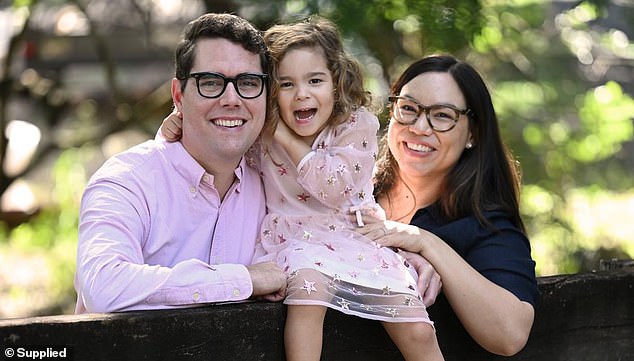A young Queenslandpolitician has been given a devastating cancer diagnosis after a routine check-up – despite having no concerning symptoms.
BrisbaneCity councillorRyan Murphywas diagnosed at 36 withprostate cancer – a condition that rarely affects men under the age of 50.
In Australia, less than 2 per cent of men aged under 49 are diagnosed with prostate cancer – but the public servant said it was ‘just his luck’ to be among the minority, with the average age of diagnosis being 70.
The dad said he only discovered his diagnosis in April this year – purely by chance.
It all started when the politician embarked on a self-initiated health kick, inspired by the arrival of his first child, a daughter named Elodie, with wife Emma Yabsley in 2021.
‘I thought, “Well, I’m in my mid-30s, this is a good midlife health check in point, just to see how things are tracking”,’ Ryan told FEMAIL.
With no alarming symptoms, Ryan booked an appointment with his GP, expecting nothing more than a routine health check-up with innocuous results.
Just days later, he received the worst news imaginable: stage two prostate cancer.
The shock of the ‘out-of-the-blue’ diagnosis hit Ryan on many levels – the biggest being that he had zero symptoms and nothing at all to indicate prostate cancer.

Brisbane City councillor Ryan Murphy, 36, was inspired to start a health kick following the birth of his daughter Elodie (centre) with wifeEmma Yabsley (right) – but was stunned to discover he had stage two prostate cancer

The Brisbane City councillor was diagnosed at 36 with prostate cancer – a condition that rarely affects men under the age of 50
Before his soul-crushing diagnosis, Ryan said his first round of blood tests in 2024 revealed higher cholesterol levels, which he admitted were likely due to an average diet and inconsistent exercise habits.
So, he immediately set about losing a few kilos before returning for a follow-up appointment with his GP.
At the next check-up, the GP asked Ryan to repeat the blood test and provided a new referral. Crucially, the doctor added a ‘PSA’ test – which measures prostate-specific antigens.
Given Ryan’s age, the PSA test wasn’t ordered out of concern that he had prostate cancer, but simply to provide a baseline result for future reference.
With no unusual symptoms and a busy life juggling work and a young family, the politician said he promptly filed the blood test referral in his car’s glove box and forgot all about it. It was only months later, while cleaning his car,that he rediscovered it.
‘I found the scrunched-up pathology form and almost threw it out. But I decided not to – and later went and did the blood test, mostly just so I could get rid of the referral paper,’ he said.
Two days later, Ryan received the unexpected news from his doctor confirming that while he’d successfully lowered his cholesterol levels, his PSA results had come back exceptionally high.
The doctor said Ryan’s PSA was ‘at 11 when the number should be under two’.

The dad said he only discovered his diagnosis in April this year – purely by chance

Following his prostate cancer diagnosis, Ryan said his ‘priorities’ have changed and that he’s now determined to be healthy and well for his family, including now four-year-old Elodie (pictured) and a new baby arriving later in the year
A follow-up MRI scan and specialist appointment confirmed the dreaded news that he had late stage two prostate cancer.
Naturally, the other surprise was Ryan’s age.
Although prostate cancer is highly prevalent, with one in six Aussies diagnosed in their lifetime, it typically affects much older men.
At the time of speaking to FEMAIL, Ryan was still in the process of meeting with his oncologist to decide the best course of action, which he believes will involve surgery.
But the dad is holding off for now until his wife, who is currently pregnant with their second child, gives birth to their new baby in upcoming months. After that, he’ll resume an active course of cancer treatment.
The prostate cancer diagnosis has been a ‘light bulb’ moment for Ryan, who believed his new ‘priority’ is to ensure he is well and healthy for his growing family.
‘After any cancer diagnosis, you find yourself asking whether you’ve spent every day prior to that correctly, and what you’re spending your time on [in the future],’ he said.

Ryan (right), pictured with wife Emma and daughter Elodie, is holding off on active cancer treatment until his family welcomes a new baby in the upcoming months
The public servant added that he’s also adopted a number of lifestyle changes, which includes more often eating plant-based foods, reducing alcohol intake, undertaking periods of fasting and continuing his weight loss efforts.
But the informal and disjointed chain of events that led to Ryan’s diagnosis raised alarm bells, prompting the politician to question the current system in place for diagnosing prostate cancer.
‘There are men who are in “health literate” postcodes, who see the same doctor and get tested regularly – so their prostate cancer is picked up early on and successfully treated,’ Ryan said.
‘Then there’s men who live in postcodes where it’s difficult to access medical services or MRI’s – and they’re not getting tested. That’s inequitable.’
The Queensland councillor speculated that many other potential diagnoses could be missed by men who weren’t as proactive about their health as he was.
‘The thing I learnt after talking to other people diagnosed with prostate cancer is just how haphazard our system of diagnosing this type of cancer’ Ryan said.

Ryan with hiswife Emma Yabsley on their wedding day
In his role as a politician, Ryan believes a prostate cancer national register of PSA test results is easily achievable given the current Australian health care ‘infrastructure’, diagnostic technology and testing facilities are all already in place.
‘This is just about coordinating it, which will place a safety net around those men who are not going to be proactively having medical check ups. ‘
Until then, the dad urges men to simply make an appointment with their GP and request a blood test that includes a PSA reading, so that they can start getting a baseline level reading.
‘Have your doctor add it onto your next blood test and then you’ll get your PSA and know your number. Then, you can check back in again later in life and just see if it’s moving.’
The young politician is campaigning to fix a broken cancer screening system, aiming to ensure others don’t slip through the cracks.
It’s something that’s also been top of mind for leading Brisbane urologist, Dr Peter Heathcote.

The young politician is campaigning to fix a broken cancer screening system, aiming to ensure others don’t slip through the cracks
The former President of the Urological Society of Australia and New Zealand is in full support of the Prostate Cancer Foundation of Australia’s current call for a national prostate cancer screening register of PSA test results. This would be similar to other the national register systems currently in place to track breast and bowel cancer screenings.
Dr Heathcote said that despite prostate cancer being ‘very common’, it had somehow been overlooked for a formalised national screening program register.
The highly publicised recent diagnosis of former US president Joe Biden, 83, reconfirmed presumptions that ‘age is a high-risk factor for prostate cancer’.
However, Dr Heathcote said awareness of prostate cancer needs to start far earlier, with the proposed screening register recommending that all men aged over 50 regularly monitor their PSA levels.
Furthermore, he noted that some groups of men are at an ‘increased risk’ of prostate cancer – including those with a family history of the disease.
‘For example, if you’ve had a father or a brother diagnosed with prostate cancer at a younger age, your risk of getting clinically significant prostate cancer doubles,’ said Dr Heathcote.
‘There’s also a relative increase when there’s familial syndromes like BRCA2, which is typically is associated with breast and ovarian cancer.

With a busy work life as a Queensland politician and a young family at home, Ryan (left) initially put off having a blood test that his doctor had recommended to check his PSA levels

In his capacity as a politician, Ryan has backed calls by the Prostate Cancer Foundation of Australia in their proposal to create a national prostate cancer screening register of PSA test results, which will ensure men aged over 50 and in some cases even 40 undergo regular blood test screenings

Leading Brisbane urologist, Dr Peter Heathcote (pictured) supports the call for a national screening register of PSA test results as a means to improve the early diagnosis of prostate cancer among Australian men nationwide
The medical practitioner underlines the fact that diagnosing prostate cancer at an early stage is crucial to the prospects of a successful treatment outcome.
However, with no signs or symptoms present early on, ‘the only way to diagnose prostate cancer when it’s at an early curable stage is after an initial PSA blood test’.
This test is then followed up by an MRI and potentially also a biopsy to confirm the cancer.
Currently, the only way that prostate cancer is being caught at an early stage is through sporadic blood tests – like how Ryan’s diagnosis came about.
When PSA levels aren’t being regularly monitored, Dr Heathcote says that unfortunately prostate cancer is more often only discovered when it’s quite advanced once classic symptoms emerge, such as ‘urgency and frequency of urination and the big red flag of blood in the urine.’
This is why the medical expert along with the politician are advocating alongside the Prostate Cancer Foundation of Australia for the introduction of a national screening register to improve the chances of catching the disease sooner than later.
Without a formal prostate cancer screening problem, Dr Heathcote notes there’s great ‘health inequality’ between those that regularly see a doctor and those that don’t.
The screening register currently being lobbied will recommend men over the age of 50 have a PSA blood level check at least every two years.This age would lower to over 40 for men in higher risk groups.
Dr Heathcote added that there’s even a tangible financial incentive for adopting a formal screening register, explaining that prostate cancer is the most expensive cancer in Australia, with the cost of treating it at over $500 million a year.








